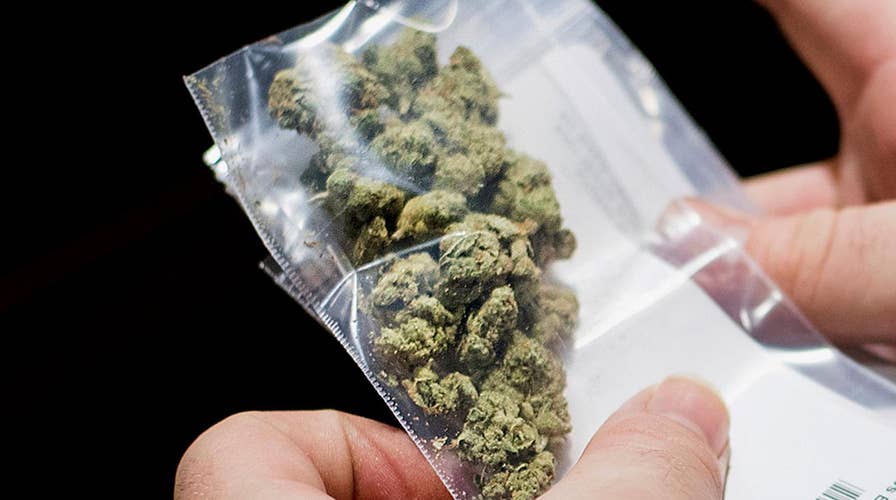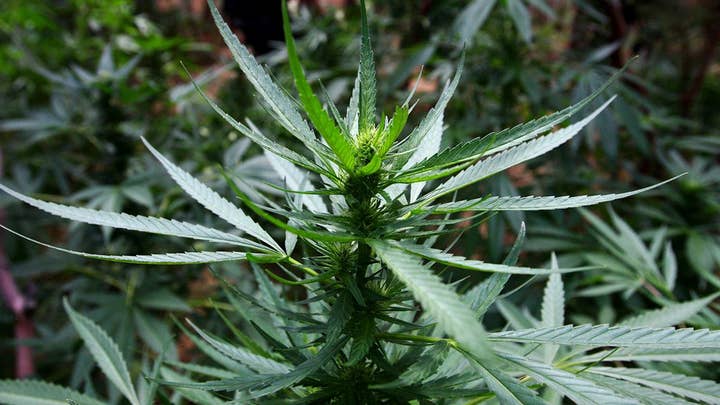Legal marijuana sales generate millions in state tax revenue
Dan Springer reports on how the states are allocating the funds.
Residents in nearly a half-dozen states could vote this fall on legalizing recreational marijuana, as the push to loosen pot laws spreads despite a tough-on-drugs message from the current Justice Department.
Michigan, Rhode Island and Connecticut are leading the conversation this election cycle on whether to legalize the use of recreational marijuana. Pro-pot advocates are organizing in those states in hopes of getting a legalization measure on the ballot.
Similar efforts are underway in Illinois and Vermont, which has already legalized recreational use but could vote this year on green-lighting commercial sales. Other states are considering legislation.
If successful, they'd join the nine other states and Washington D.C., that have already legalized recreational use.
“This is what the citizens want, as proven by the nine states that have approved it for adult-use and more than 30 others who have adopted medical programs and decriminalized procession and use,” said Marco Hegyi, CEO of marijuana cultivation equipment company GrowLife.
In Michigan, officials are still working to validate signatures after over 360,000 were gathered in support of a legal-pot ballot measure. Roughly 250,000 are needed to qualify.
Cannabis remains illegal under federal law, but under the Obama administration states were given the leeway to make their own legislative decisions on marijuana use.
Attorney General Jeff Sessions pulled back on that guidance in January, but Colorado Republican Sen. Cory Gardner has since said President Trump has offered assurances legal-pot states will be protected.
While tensions between the states and Washington rise and fall, pro-legalization groups continue to face opposition from critics who warn that loosening drug laws is not the right move.
"We're concerned that we're moving in a direction that's going to have a very negative societal impact on homes, on young people, on driving, crime -- all those types of things that have a normal impact from alcohol or drug abuse is going to be accelerated with the legalization of marijuana,” said Mike Griffin, public affairs director of the Georgia Baptist Mission Board.
In addition to the states that may put legal pot to a vote, others are considering legislation, including New Jersey and Delaware.
“A stronger and fairer New Jersey embraces comprehensive criminal justice reform -- including a process to legalize marijuana,” tweeted New Jersey Democratic Gov. Phil Murphy.
Gubernatorial candidates from around the country, including Democrats Jeff Apodaca of New Mexico and Andrew Gillum of Florida, also are making legalization part of their platform.
“Legalization of marijuana is a civil rights & economic issue — and Florida deserves a Governor who isn’t afraid to say so,” Gillum tweeted.
While critics still see marijuana as a gateway drug with negative health and societal impacts, others are swayed by the potential for more tax revenue.
In 2014, the first full year that recreational marijuana was legal in Colorado, $63 million was collected from medical and recreational marijuana together in tax revenue, according to The Washington Post.
“We believe that expanding access to cannabis is a boon for local economies and also provides people with a safer alternative to other substances, such as alcohol or opioids,” said Carlos Gutierrez, director of business development at Prime Harvest.
At the start of 2018, all but four states -- Idaho, South Dakota, Nebraska and Kansas -- have legalized at least one form of marijuana use.
The Associated Press contributed to this report.






